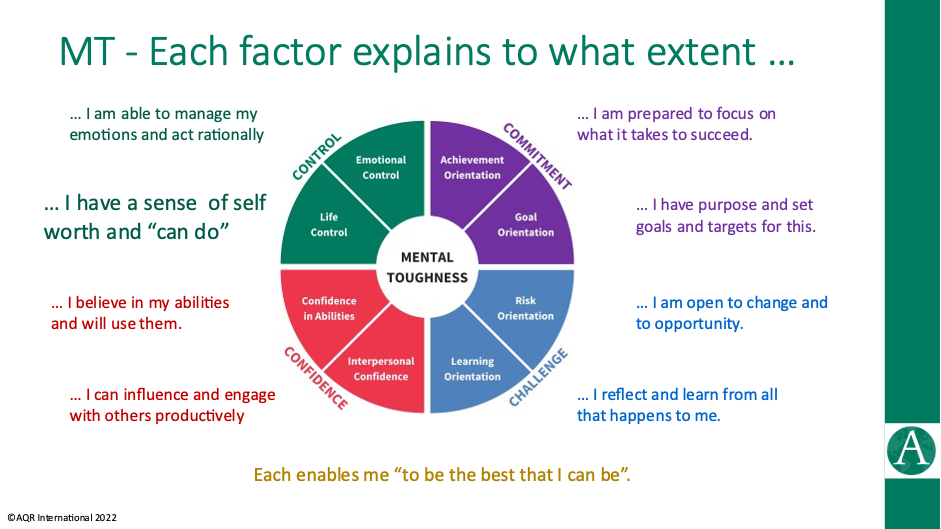“If you think you can, you can, if you think you can’t, you are probably right” (Henry Ford)
This is the first in a series of posts about the eight factors that form the mental toughness concept. Mental toughness is a personality trait that describes our mental responses, how we think, to stressors, challenges and opportunities that make up our life and work experiences.
Fundamentally important, it is a major influence on our behaviour – how we act.
Life control is one of the two factors that contribute to our overall sense of Control. It describes the extent to which we believe we have sufficient control over our lives and circumstances to be able to achieve much of what we want to achieve. It is what is often meant by the sense of “can do”. It’s where the sense of self-worth sits.
It explains why two people, who are similar in most respects, will respond differently when asked to carry out the same task. One will say immediately “Just leave it with me”. The other will say “Mmmm. I am not sure. I don’t think I can do it. I might, if ….”.
The difference lies in their respective mental approaches.
This factor, like all the factors, is a spectrum with mental sensitivity at one end and mental toughness at the other. It is not a black and white idea – there are many shades in between. In fact, around 70% of a population will have mental responses that reflect elements of both.
And, although each factor is independent of each other, the way they can interplay will create different outcomes. There are at least 40,000 possible combinations at a base level.
So, even two, who are similar in terms of Life Control, might differ in their response to tasks if one has a high level of, say, Achievement Orientation (and is minded to try) and the other has a low level (and is not minded to make an effort)
This illustrates that personality is complex and nuanced and how the mental toughness concept (and the MTQPlus) measure can bring that nuance to the practitioner.
The image helps us to get an insight into this. Think about how different levels of Life Control might result in different outcomes with different levels of the other seven factors.

There is another layer of complexity to consider. All things being equal, being more mentally tough will give an advantage to the individual. But not always.
It is perfectly possible for a mentally tough person to struggle and for the more mentally sensitive to thrive. The key is self-awareness – about how they are responding in their head. Ordinarily, this is invisible which is a major challenge for the practitioner and the individual.
If self-aware of one’s level of mental toughness, one can either develop it or one can adopt practices that help to compensate for the level of sensitivity.
This is the essence of coaching. Understanding what makes you tick and what gets in the way.
How can a mentally tough person struggle? The sense of “can do” can result in taking on too many tasks, tasks which they realistically cannot complete, burnout through overload and intimidating others who are less positive than them. In leadership roles, they can over-commit for the team, and they can micromanage if they don’t trust others.
What are the positives for a more mentally sensitive person in terms of Life Control? They don’t jump into a task without first checking they can do it. They can be very down to earth about their ability as a person to take on tasks. They can approach a task in a different way.
Given this degree of nuance is true for all eight factors and that all interplay with one another, we have a lens through which we can help people look at themselves with all the complexity involved and understand exactly where their development needs might lie.
This illustrates that the mental toughness concept is about differences and not about “good or bad” or labelling people as types or colours. We are all remarkably different and similar.
There is evidence emerging that “one size fits all” approaches although targeted at individuals generally fail and can do more harm than good because they aren’t customised.
Assessment is a challenge. Because the factors are invisible and any one, or combination of factors, can be the explanation for a behaviour or wellbeing outcome, it can be very difficult to assess someone’s mental toughness profile with a realistic level of confidence. Fortunately, a by-product of the considerable research behind the concept has resulted in the development of a reliable and valid psychometric measure that assesses this and the other factors with a high degree of reliability and validity.
The mental toughness concept and the MTQPlus measure represent a real advance in our understanding of individuals (and organisations), for practitioners who are engaged in developing people and organisations, understanding mental toughness goes beyond CPD. It should really be a part of their armoury.
Like the image used in this post on Life Control and others in our ‘Eight Factors’ series? A set of downloadable posters are available here.



